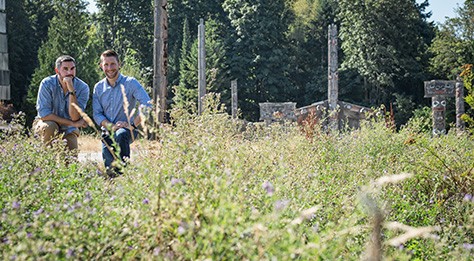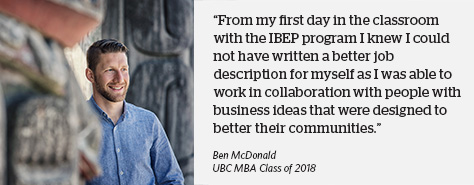
Ch’nook Indigenous Business Education Program shows MBAs a new path

UBC MBA graduates Ben McDonald and Vanja (VJ) Terzic are not following the career path they originally envisioned for themselves—in a good way.
Instead, the pair have taken their experience from an MBA volunteer internship in Kenya and transformed its teachings into a business program they helped design and have successfully rolled out at home in B.C.
In May 2017, the pair helped launch a pilot project, called Ch’Nook Indigenous Business Education Program (IBEP), which brought a condensed student-led business curriculum to three communities in rural B.C.
The IBEP’s business course was a reimagining of the school’s successful UBC Sauder Social Entrepreneurship (SSE) Kenya curriculum, which is a four-week business program led by UBC Sauder students focused on developing business skills and encouraging entrepreneurship among its Kenyan participants. It was remodelled to serve the needs of an Indigenous context within Canada and was designed to be delivered on-site over a two-week period.
In addition to volunteering with SSE Kenya, McDonald and Terzic travelled to Anahim Lake, Bella Bella, and Port Alberni to offer Indigenous members of these communities some of the resources they need to help face the challenges of business ownership.
For McDonald and Terzic, it’s about using their education to give back and push the boundaries of what an MBA can do.
Both completed engineering degrees before entering the MBA program, and say that as they approached graduation they knew they were not going to follow the more traditional executive business path of finance or banking. But neither regrets trading the boardroom for the classroom. In fact, the experience remains transformative to this day.
“From my first day in the classroom with the IBEP program I knew I could not have written a better job description for myself as I was able to work in collaboration with people with business ideas that were designed to better their communities,” says McDonald. “This is really why I came to do an MBA.”
Positive prospects
IBEP was slated to be a one-off program with the potential for more if the funding was realized. But it has grown legs since those first days in the classroom, with requests for additional courses and a second delivery of the IBEP in Bella Bella.

The program and its leaders are also acting as a gateway to introduce the latest cohort of UBC Sauder MBAs to the potential of their business knowledge and their usefulness in the social impact sphere, explains Terzic.
“We’ve had the opportunity to explore the versatility of our education and we now see where it can take us and how we can use our MBA to assist in furthering other people’s business aspirations,” he says. “We’re also talking to some of the new MBA students about our experiences to show how business can offer collaborative solutions to challenges in our own backyard.”
Potential for the program continues to grow.
Indeed, on his second trip to Bella Bella earlier this year, McDonald sat in on a meeting of the community’s tourism board. It was a rare opportunity to observe the inner workings of Bella Bella’s administration, “and I was privileged to be invited to share my thoughts and opinions on new business development ideas for the community,” says McDonald.
Metamorphic MBA
Through its evolution, IBEP has required a deep understanding of socially responsible business, ethics and, perhaps most importantly, the ability to think on one’s feet—skills that many should have, but at which only few excel, according to Frances Chandler, director of Ch’nook Indigenous Education at UBC Sauder.
"The MBA students that we selected had the skills to adapt to different, sometimes remote settings, and change directions when needed. They had to be able to handle it—and they did,” explains Chandler. “It’s sometimes difficult to role with those punches, but these students are special.”
There have been long-lasting impacts of the original program and its leaders say they are always looking for ways to push it forward and continue forging positive relationships.
Some of McDonald and Terzic’s students from the first program they taught still keep in touch, asking the pair for help with developing business plans to further their ideas first conceived in IBEP. Others just reach out for advice about entrepreneurial next steps.
“We want this program to continue,” says McDonald, “not just for the members of the community that can improve their business knowledge, but because we see that this has so much applicable value for MBA students too.”
Teresa Pan, Assistant Dean of UBC Sauder’s Robert H. Lee Graduate School, agrees this program is a beneficial learning experience for both the MBAs and its participants.
“It has been very rewarding to hear the feedback we’ve received from participants about how the program has benefitted them. Additionally, it’s been tremendous to see the impact on our students as a result of the unique opportunity they have been granted to engage with these communities and to learn about Indigenous business and culture.”
The program’s curriculum has been redesigned once again and is currently being delivered to Indigenous urban participants in Vancouver’s Downtown Eastside.